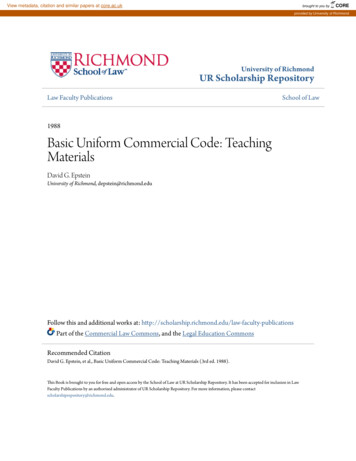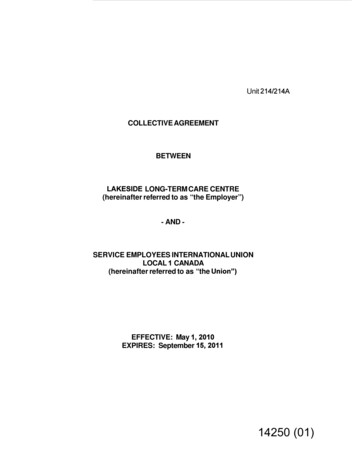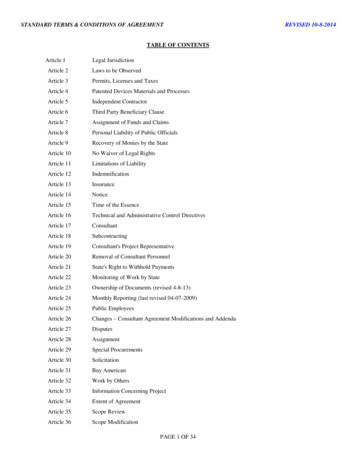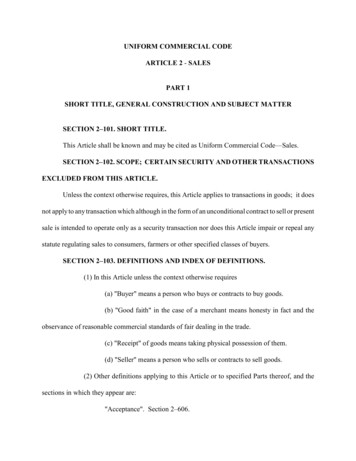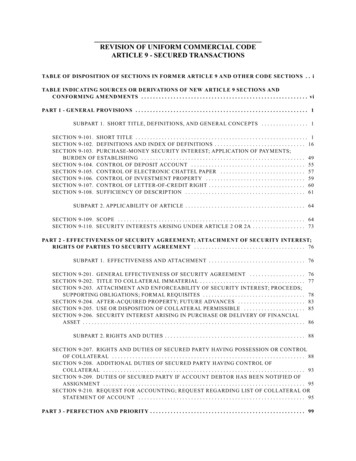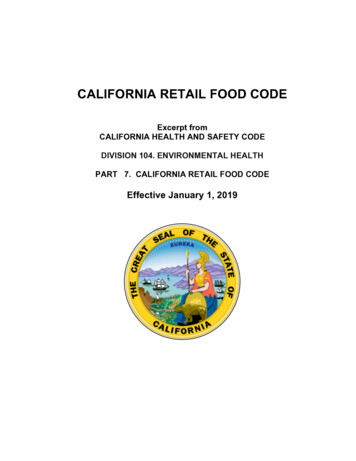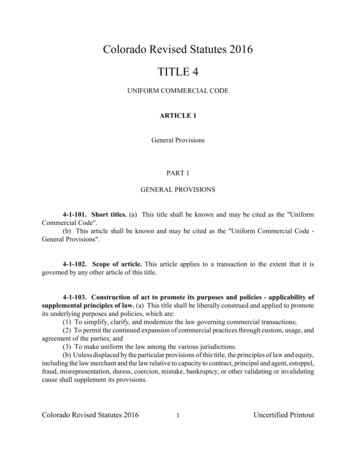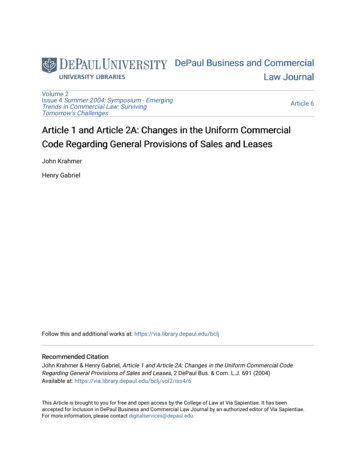
Transcription
View metadata, citation and similar papers at core.ac.ukbrought to you byCOREprovided by Louisiana State University: DigitalCommons @ LSU Law CenterLouisiana Law ReviewVolume 26 Number 2The 1965 Bailey LecturesPersonal Jurisdiction SymposiumFebruary 1966Article 5 of the Uniform Commercial CodeNorman PenneyRepository CitationNorman Penney, Article 5 of the Uniform Commercial Code, 26 La. L. Rev. (1966)Available at: s2/7This Article is brought to you for free and open access by the Law Reviews and Journals at LSU Law Digital Commons. It has been accepted forinclusion in Louisiana Law Review by an authorized editor of LSU Law Digital Commons. For more information, please contact kreed25@lsu.edu.
ARTICLE 5 OF THEUNIFORM COMMERCIAL CODENorman Penney*Article 8 provides a modernized and improved statute regulating the transfer of investment securities. Building upon theUniform Stock Transfer Act and the Uniform Act for the Simplification of Fiduciary Security Transfers, the Code draftsmenhave provided an integrated statute to regulate all securitiesmeeting the broad functional definition of "investment securities."Today's lecture will deal with Article 5 of the UniformCommercial Code. Article 5, concerning letters of credit, provides a new statutory framework upon which this important financing device can be based. It is used primarily in financinginternational sales transactions for which elaborate rules andpractice have been developed by the bankers engaged in thisfield, but it may also be used in domestic transactions.I plan to make a few general remarks about article 5 andthen devote the balance of the time allotted to a discussion ofparticular problems under the article.* LETTERS OF CREDIT -CODIFICATION OF THE SZTEJN RULEThe Code defines a letter of credit as an "engagement by abank or other person made at the request of a customer., thatthe issuer will honor drafts or other demands for payment uponcompliance with the conditions specified in the credit."' Theconditions may relate merely to the proper identification of theperson drawing the drafts, as in the case of "clean" or travelers'letters of credit, or, in the case of the more important and morecommon commercial documentary credits, may require that thedraft be accompanied by certain prescribed documents such as2bills of lading or warehouse receipts.*'if 'UbnIOCOMMRBCIAL CODR § 5-103(i) (a).2. The Code applies to both documentary and clean credits. See id.§ 5-102 (1).[277J
LOUISIANA LAW REVIEW[Vol. XXVIThe documentary letter of credit is of enormous economicimportance and performs a major role in many internationalsales transactions. I am advised that this instrument is widelyused in New Orleans in the importing and exporting of suchcommodities as coffee, sugar, and cotton. As a matter of fact,Louisiana is one of the few states, other than New York, thathas any decisional and statutory law on the subject of letters ofcredit. There appear to be five cases,3 three of them decidedin federal courts, and four statutory provisions. 4 Two of thecases grew out of the failure of the Interstate Trust and Banking Company, which was in the business of issuing credits insupport of coffee importing transactions in the early '30's. 5Article 5 of the Uniform Commercial Code is not at variancewith the few rules set forth in these cases and statutes otherthan in one minor matter relating to form. The Code's simplerequirements as to form6 do not specify the necessity for twosignatures on bank credits as do the Louisiana Revised Statutes. 7Let me use a somewhat simplified version of the InterstateTrust and Banking Company case fact pattern as an illustrationof how a letter of credit transaction works. A Brazilian coffeeseller makes a contract for the sale of coffee to a New Orleansimporter and specifies a letter of credit as the means of payment. At least two inferences can be drawn from the fact thatthe parties provided for a letter of credit. First of all, it islikely, as in all documentary transactions, that the seller is notwilling to do business relying on the open credit of the NewOrleans importer whose credit rating and reliability may beunknown or insufficient to the Brazilian. He wants the firmobligation of a well-known bank before he releases control of thegoods. It is also possible that the Brazilian seller is a middleman who wants to use the bank credit issued to cover this con3. Ornstein v. Hickerson, 40 F. Supp. 305 (E.D. La. 1941) ; VivacquaIrmaos, S.A. v. Hickerson, 193 La. 495, 190 So. 657 (1939) ; Bank of Americav. Whitney-Central Nat'l Bank, 291 Fed. 929 (5th Cir. 1923), cert. denied, 264U.S. 598 (1924) ; In re Interstate Trust & Banking Co., 188 La. 211, 176 So. 1(1937). See also Pan-American Bank & Trust Co. v. Nat'l City Bank of NewYork, 6 F.2d 762 (2d Cir. 1925), cert. denied, 269 U.S. 554 (1925), relating tothe ultra vires question.4. LA. R.S. 6:237 (powers of banking associations); 6:39 (signatures to letters of credit) ; 6:40 (recordation of drafts accepted or letters of credit issued)6:41 (penalty for violation of 6:38-40 (1950).5. Ornstein v. Hickerson, 40 F. Supp. 305 (E.D. La. 1941) ; Vivacqua Irmaos,S.A. v. Hickerson, 193 La. 495, 190 So. 659 (1939).6. UNIFORM COMMERCIAL CODE § 5-104.7. LA. R.S. 6:39 (1950).
1966]ARTICLE 5tract as security to borrow money from a Brazilian bank to buythe coffee. 8Let us focus for a moment on the mechanics of having aletter of credit issued by the New Orleans bank. The coffeeimporter first enters an agreement with his bank by which thebank engages to issue a credit to the Brazilian seller and forwhich the bank receives a commission from the customer. Thebank secures itself by having the documents controlling the purchased coffee run in favor of the bank. The agreement betweenthe buying customer and bank will typically exculpate the bankfrom most conceivable responsibilities other than the duty ofexercising ordinary care in seeing to it that the documents specified in the letter of credit are tendered by the presenter of thedraft and that they are regular on their face.9 In the kind oftransaction which we are using as an illustration the bank willthen send the seller a letter of credit instrument irrevocablyundertaking to honor drafts drawn on it, which total the purchase price, when such drafts are accompanied by documentsevidencing delivery of the coffee to a ship sailing from Braziland bound for New Orleans. The credit will require that theocean bill of lading, controlling the goods, run in favor of thefinancing New Orleans bank. It will itemize exactly what documents are to accompany any draft drawn under the credit andmight include, in addition to the on board bill of lading, a consular invoice, a commercial invoice, and an insurance policy orcertificate covering the usual risks.The letter of credit will also undoubtedly include a provisionthat "unless otherwise expressly stated, [the] credit is subjectto the Uniform Customs and Practice for Commercial Documentary Credits fixed by the Thirteenth Congress of the International Chamber of Commerce." These recently revised Customs and Practice adhered to by most of the major banks of theworld'0 include further elaborate exculpatory provisions, and8. The Brazilian seller may have a letter of credit issued by a Brazilian bankto pay his seller. This so-called "back to back" credit will usually call for exactlythe same documents to enable the Brazilian seller to meet the conditions of theprimary credit.9. Examples of agreement forms may be found in WARD & HARFIELD, BANKCREDITS AND ACCEPTANCES 202-08 (4th ed. 1958).10. Reprints of Uniform Customs and Practice for Documentary Credits(1962), are contained in INTERNATIONAL CHAMBER OF COMMERCE BROCHURENo. 222 (1962), distributed by the Banker's Association for Foreign Trade(U.S.A.) and the Committee on International Banking (U.S.A.). They are alsoreprinted in HOGAN & PENNEY, NEW YORK STATE SUPPLEMENT TO BANKS ANDTHE UNIFORM COMMERCIAL CODE (1964) published by the New York State Bank-
280LOUISIANA LAW REVIEW[Vol. XXVIgo to great lengths to specify the details of documentary compliance. Separate provisions deal with the customs of the tradewith respect to shipping terms, provisions on documents, bills oflading, railway bills of lading, insurance, invoices, and the interpretation of terms.In the illustration we have used, the Brazilian exporter maywell receive the letter of credit instrument directly from theNew Orleans issuer. Another common means of notifying theseller of the issuance of the credit is to use a Brazilian bank asthe agent of the New Orleans bank to "advise" the credit. Therequest to open the credit as between the two banks would inall likelihood be accomplished by the use of a cablegram. TheBrazilian bank will deliver an instrument to the seller formallyadvising that the New Orleans bank has issued the credit andspell out the conditions for documentary compliance. The advising bank may also offer to undertake the collection of the draftfor the account of the seller and to advance money in anticipation of collection. In some cases the advising bank may binditself to honor drafts when accompanied by the appropriatedocuments, in which case it is in the same legal position withregard to the seller beneficiary as the New Orleans issuer itselfand is spoken of as a "confirming bank."When the seller receives the letter of credit, he has a bindingbank commitment that assures him of payment when the conditions of the letter are met. When he puts the coffee on boardthe ship in Rio and secures the documents called for, he merelyhas to attach them to a draft for the price and he can count onthe draft being paid.The provisions of Article 5 of the Uniform Commercial Codewould ordinarily affect such a letter of credit transaction in onlya few minor respects. There should be no concern on the partof Louisiana practitioners and bankers about having to learnnew law or change their practices. The proposed statute is limited to a few skeletal rules and key definitions which are designedto afford an intelligble framework upon which letter of creditbusiness can be done. An early section on "scope" specifies thekind of engagements which are embraced within the article andthose which are excluded." The definitions in section 5-103ers Association. They are commented upon and described in Shattuck & Guernsey,Letters of Credit - a Comparison of Article 5 of the Uniform Commercial Codeand the Washington Practice, 37 WASH. L. Rxv. 325-66, 500-56 (1962).11. UNIFORi COMMERCIA. CODE § 5-102.
ARTICLE 519661are in full accord with commercial understanding. The few formal requirements of section 5-104 present the one possible variation with Louisiana law in the failure to require two signatures12as earlier mentioned.While letter of credit experts have long recognized the absence of the need for consideration to establish or modify acredit, section 5-105 alleviates any doubts on this score. It issometimes important to know at what point in time the issuingbank is bound to the seller-beneficiary, in our example, theBrazilian exporter. Clear rules with respect to the "establishment" of an irrevocable credit as to the customer and beneficiary are set forth in section 5-106. Section 5-107 spells out therole and responsibilities of the advising bank. In our example,such an advising bank would undoubtedly be located in Brazil,the home territory of the seller. The Code makes advising banksresponsible for their own errors in transmitting the notice ofany credit, but where such error is made the issuer is boundonly by the credit's original terms. If the local bank "confirms"as well as "advises," it becomes directly obligated on the creditto the extent of its confirmation as though it were an issuer. 13Other provisions deal with "notation credits,' 4 the availabilityof the credit in portions,' 5 warranties on transfer and presentment,' 6 time allowed for honor or rejection, 17 indemnities, 8 remedy for improper dishonor or anticipatory repudiation, 9 transfer and assignment, 20 and insolvency of banks holding funds fordocumentary credits. 21 Although some of the rules provided arenew to letter of credit law and new to Louisiana, no major difficulty or objection should be anticipated.There are two provisions which deserve more than mere inclusion in a summary listing. They are section 5-109 concerning the issuer's obligation to its customer, and section 5-114 respecting the issuer's duty and privilege to honor and right toreimbursement. These provisions are basic to the letter of credit12. See text at note 6 supra.13. UNIFORM COMMERCIAL d.§ 5-108.§ 5-110.§ 5-111.§ 5-112.§ 5-113.§ 5-115.§ 5-116.§ 5-117.§ 5-107 (2).
LOUISIANA LAW REVIEW[Vol. XXVItransaction and are the most important found in the letter ofcredit article.The obligations of an issuer to its customer are spelled outin section 5-109. The issuer owes its customer a duty of goodfaith and the observance of any general banking usage, but itassumes no responsibilities for the performance of the underlying contract. The bank is to be concerned only with documents. Furthermore, the issuer is not liable for any acts oromissions of any person other than itself or its branches. Issuers are not held responsible for knowledge or lack of knowledge of the usages of any particular trade. 22 The issuer is required to examine the documents with care to ascertain thatthey comply on their face with the terms of the credit, but noliability is imposed for the genuineness, falsity, or effect of anysuch documents. Section 5-114, dealing with the issuer's dutyand privilege to honor and right to reimbursement, emphasizesagain that it is a deal in documents and not in goods. The issueris required to honor a draft complying with the terms of thecredit regardless of whether the goods or documents conform tothe underlying contract of sale. Even when forged documentsare presented, the issuer is bound to honor the draft where thepresenter is a negotiating bank or other intermediary party inthe position of a holder in due course. If, for example, ourBrazilian coffee exporter had discounted the draft with a Brazilian bank which qualified as a holder in due course, it wouldbe incumbent upon the issuing bank to honor the draft whenpresented on behalf of the Brazilian bank even though it becomes apparent that the exporter had shipped sawdust ratherthan coffee or had obtained forged documents of title, assuming,of course, that the documents appeared "on their face to complywith the terms of the credit. ' 2- The underlying circumstancesand even the fact of forgery of a document are immaterial inthis deal in "superficially regular" documents. The Code permits the innocent Brazilian bank to recover against the issuerbut then allows the issuer to obtain reimbursement from its customer who initially chose to rely upon the seller. 24 One might22. Professor Soia Mentschikoff has speculated as to the effect of advertisements published by large banks, such as Chase Manhattan, proclaiming thatthey have people in departments who are experts in all the intricacies of thevarious trades. Mentschikoff, Article 5-Letters of Credit, UNIFORM CoMmERCIAL CODE HANDBOOK (ABA Section of Corporation Banking and Business Law)163-64 (1964).23. UNIFORM COMMERCIAL CODE § 5-114(2) (a).24. Id. §5-114(3).
1966]ARTICLE 5argue at this point that, in fact, the customer-buyer had madeclear his lack of reliance by insisting upon a letter of credit.The simple answer to this argument is that the buyer could haverequired additional documents and certificates which would havesubstantially reduced the risk of forgery, such as an inspectioncertificate, consular invoice, or the like. Even though the documents are forged, if the bank exercises reasonable care in examining them, the Code places the risk upon the customer-buyerrather than the issuing bank upon the theory that the bank isin no better position to detect forgeries than the customer.Banks also argue vigorously that making them insurers of genuineness would unduly add to the cost of issuing credits and leadto higher bank charges.A different problem is encountered when the presentation ismade on behalf of the beneficiary himself, or a person not inthe position of a holder in due course. If, in fact, the documentsare fraudulent or forged, the issuer is given the option to refusehonor of the draft.2 5 As against its customer, however, the issuing bank, acting in good faith, may honor a draft drawn againstthe credit notwithstanding a receipt of notice from the customerof fraud, forgery, or other defect not apparent on the face ofthe document. In that situation the Code provides that the customer may apply to a court of appropriate jurisdiction to enjointhe bank from honoring the draft.2 6 The New Orleans coffeeimporter might say to his New Orleans bank, "I have beenadvised that the bill of lading representing the coffee is forged,"or "that the so-called coffee is in fact sawdust." The issuingbank is faced with a difficult decision. If it chooses to believeits customer and dishonor the draft, it risks the impairment ofthe currency of its letters of credit in Brazilian trade circles,if it later turns out that the documents were not in fact forgedor the shipment was in fact coffee. On the other hand, if thebank chooses to honor the draft and the coffee turns out to besawdust, the bank will suffer a loss of reputation and good willwith its New Orleans customer and his friends. The Code doesnot solve this problem but gives the bank some protection if itmakes a good faith decision. If the bank chooses to honor thedraft the customer is left to his recourse against the seller forbreach of warranty and of course this presents the customer25. Id.§ 5-114(2) (b).26. Ibid. See also Sztejn v. J. Henry Schroder Banking Corp., 177 Misc. 719,31 N.Y.2d 631 (Sup. Ct. 1941) ; Balbo Oil Corp. v. G. D. Zigourakis, 40 Misc. 2d710, 243 N.Y.S.2d 806 (Sup. Ct. 1963).
LOUISIANA LAW REVIEW[Vol. XXVIwith the possibility of having to bring suit in Brazil. Since nosuch injunction cases have been reported in Louisiana, the Code'sprovision for this remedy would seem to fill a definite need ina jurisdiction with such a relatively large volume of letter ofcredit business.There may be some pressures to leave out article 5 in anyproposed enactment legislation; however, I believe that thiswould be a great mistake. 27 While New York has pretty wellemasculated the article, 28 there appears to be little prospect ofproblems generated by credits on which both Louisiana and NewYork bankers appear. My impression is that the Louisiana banksare firmly enough established in this area so as not to requireNew York banks to issue, confirm, or advise. In the rare casewhere there is such a potential dual arrangement, difficultiescan be avoided by careful draftsmanship.27. See comment in support of the rejection of the New York variation of§5-102 in REPORTS OF THE PERMANENTCOMMERCIAL CODE, nos. 1 and 2 (1962).EDITORIALBOARDFOR THEUNIFORM28. UNIFORM COMMERCIAL CODE § 5-102(4) (N.Y.), discussed in Harfield,Code Treatment of Letters of Credit, 48 CORN. L.Q. 92, 95-98 (1926) (commenting on an earlier amendment to § 5-102(1)), reads:"(4) Unless otherwise agreed, this Article 5 does not apply to a letter ofcredit or a credit if by its terms or by agreement, course of dealings or usageof trade such letter of credit or credit is subject in whole or in part to theUniform Customs and Practice for Commercial Documentary Credits fixedby the Thirteenth or by any subsequent Congress of the International Chamber of Commerce."
Article 5 of the Uniform Commercial Code Norman Penney This Article is brought to you for free and open access by the Law Reviews and Journals at LSU Law Digital Commons. It has been accepted for inclusion in Louisiana Law Review by an authorized editor of LSU Law Digital Commons. For more information, please contactkreed25@lsu.edu.



